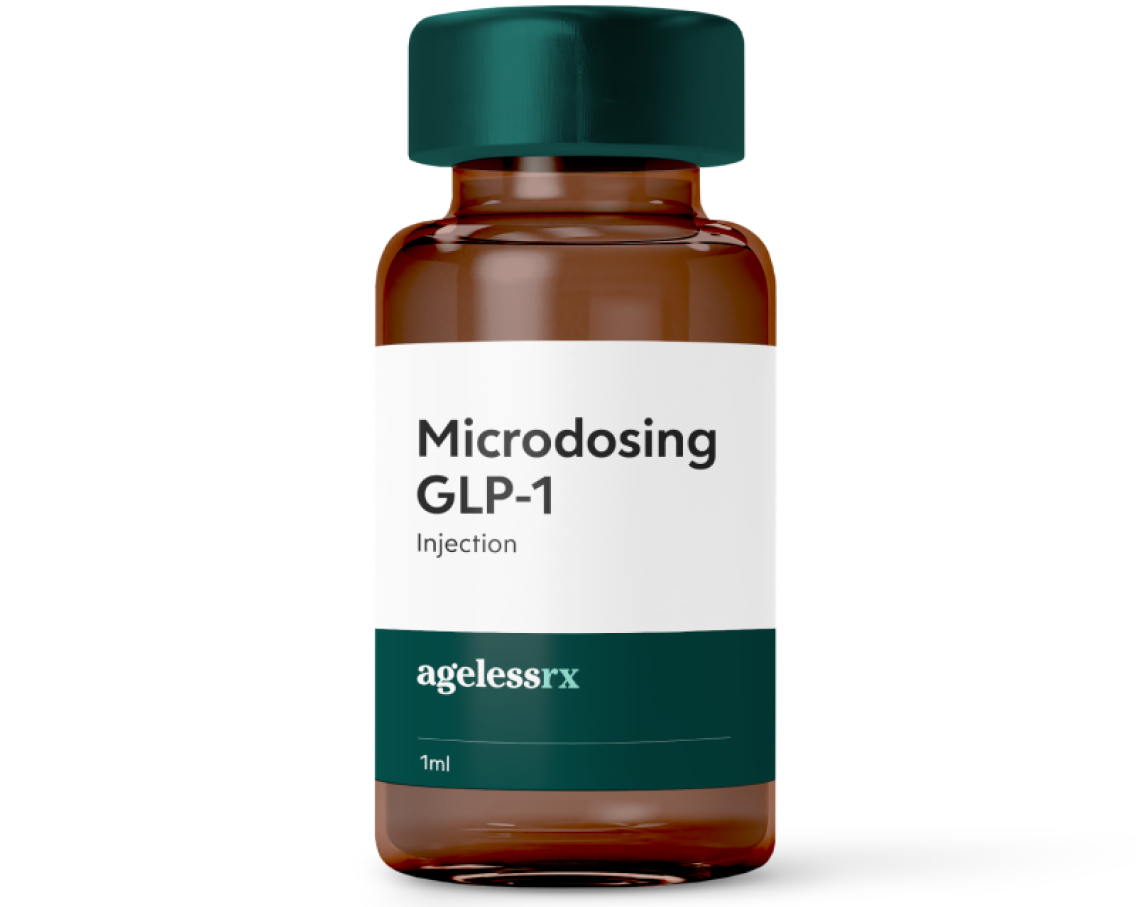Background
& history of use
Potential health & longevity benefits
Research & studies

What the evidence suggests:Low-dose GLP-1 medications may target hallmarks of brain aging and protect brain health.
This review paper highlights preclinical and clinical studies indicating that GLP-1 drugs, including low dose formulations such as exenatide, may offer neuroprotective benefits by targeting hallmarks of brain aging through enhancing DNA repair, boosting antioxidant responses, reducing inflammation and improving mitochondrial function.

What the evidence suggests:In patients with fatty liver disease, low-dose Semaglutide may enhance physical function and energy levels.
In individuals with non-alcoholic fatty liver disease, low doses of Semaglutide (0.1–0.4 mg) administered over 72 weeks is associated with enhanced physical function and increased energy levels, as reported through standardized self-assessments

What the evidence suggests:Low-dose Semaglutide may improve physical function, emotional wellness, and overall quality of life.
For patients with type 2 diabetes and high cardiovascular risk, treatment with 0.5 mg Semaglutide has been linked to improvements in health-related quality of life including physical and emotional domains of health.

Once-Weekly Semaglutide in Adults With Alcohol Use Disorder: A Randomized Clinical Trial | Substance Use and Addiction Medicine | JAMA Psychiatry | JAMA Network
What the evidence suggests: Low doses of Semaglutide may reduce addictive behaviors in adults with alcohol use disorder.
A randomized clinical trial demonstrated that once-weekly administration of 0.5 mg Semaglutide over nine weeks led to significant reductions in cravings and consumption of alcohol and cigarettes among adults with alcohol use disorder. This data suggests low doses of GLP-1 drugs can have effects on the brain to help curb impulsive behaviors and cravings, highlighting interesting potential for supporting healthy lifestyle change

Anti-inflammatory benefits of Semaglutide: State of the art – ScienceDirect
What the evidence suggests: Low-dose GLP-1 medications may lower chronic inflammation and improve quality of life for those with age-related diseases.
A review of multiple studies indicates that low-dose GLP-1 RAs can reduce pro-inflammatory markers such as TNF-alpha, IL-6, and hsCRP, contributing to improved quality of life and health outcomes in individuals with inflammatory conditions, including cardiovascular and kidney diseases.

Semaglutide and Cardiovascular Outcomes in Obesity without Diabetes | New England Journal of Medicine
What the evidence suggests: Even low doses of GLP-1 medications may reduce the rate of heart attack, stroke, or death.
Clinical trials have shown that Semaglutide use is associated with a reduced incidence of cardiovascular events, including mortality, heart attack, and stroke in individuals with obesity. This includes individuals on low doses of Semaglutide. Long-term studies are needed to validate the potential cardioprotective effects of low dose GLP-1 in generally healthy individuals

A Review on the Efficacy and Safety of Oral Semaglutide – PMC
What the evidence suggests: Low-dose Semaglutide may reduce the rate of major cardiovascular events and death in patients with metabolic disease.
Low-dose formulations of Semaglutide examined in this review paper reduce the incidence of major adverse cardiovascular events and death in overweight and/or diabetic individuals. Long-term studies are needed to validate the potential cardioprotective effects of low dose GLP-1 in generally healthy individuals

What the evidence suggests:Animal studies show that low-dose GLP-1s may target hallmarks of brain aging and improve cognitive function in models of Parkinson’s and Alzheimer’s.
Laboratory studies in animals indicate that GLP-1 RAs target hallmarks of brain aging and may activate neuroprotective pathways that promote cellular waste removal, reduce neuroinflammation, promote mitochondrial health and regeneration which may alleviate symptoms of cognitive decline in models of Parkinson’s and Alzheimer’s diseases.

Weight Loss Outcomes Associated With Semaglutide Treatment for Patients With Overweight or Obesity
What the evidence suggests: Those taking lower doses of GLP-1s may experience reduced side effects.
Individuals receiving lower doses of Semaglutide over six months reported fewer side effects compared to those on higher doses, suggesting that lower dosing may enhance long-term adherence and longevity outcomes.

Pioneering research in Microdosing GLP-1
- The AgelessRx Applied Science Team is leading the first clinical trial focused on the healthspan-enhancing potential of Microdosing GLP-1
- Ongoing observational study including long-term tracking of diverse health outcomes in over 1,000 patients using a growing real-world database of patient-reported data
- Clinical collaborations are currently in development to expand the scope and impact of this research


How it works
- GLP-1s bind to GLP-1 receptors beyond the brain and gut, reaching the heart, kidneys, blood vessels, and immune cells
- Shown to support signaling to longevity-related pathways like AMPK and mTOR, affecting key Hallmarks of Aging like oxidative stress, inflammation, DNA repair, mitochondrial function, and autophagy
- At low doses, may subtly restore balance to hormone signaling, reduce inflammation (immune cells), improve cognitive function, and cardiometabolic health
- Effects may vary based on individual biology and with factors including inflammation, weight, lifestyle, metabolic health, and health history.

Explore Microdosing GLP-1
- May modulate inflammatory pathways
- May reduce risk of cognitive decline
- May support cardiovascular health
- May improve mitochondrial function and oxidative stress
- Low doses may reduce side effects

Starting at $99/mo
FAQs
How do you microdose with GLP-1?
Microdosing GLP-1 is a low-dose prescription of Injectable Semaglutide.
Injectable Semaglutide is taken as a subcutaneous injection in a fatty layer of skin, such as your abdomen or thigh.
Microdosing GLP-1 uses the smallest measurements on your syringe. Measuring the correct dose is easy, but so is overmeasuring. Pay extra attention to the measurements on your syringe to ensure that you’re receiving the most accurate dose.
Can I transition to a regular dose if needed?
If you’re looking for a higher dose than the maximum prescribed dose, you must switch to a full-dose GLP-1 prescription. If you feel you’re not meeting your health goals on your prescribed dose, contact your prescriber.
See all FAQsImportant safety information and common side effects
Do not use with other GLP-1 receptor agonist medications, or any other products containing Semaglutide.
Side effects
Microdosing GLP-1 is a low-dose Injectable Semaglutide prescription.
Injectable Semaglutide has not been evaluated by the FDA, but side effects are expected to be similar to other Semaglutide-based medications reviewed by the FDA, which have the following side effects: nausea, diarrhea, vomiting, constipation, abdominal (stomach) pain, headache, fatigue, dyspepsia (indigestion), dizziness, abdominal distension, eructation (belching), hypoglycemia (low blood sugar), flatulence (gas buildup), gastroenteritis (an intestinal infection), and gastroesophageal reflux disease (a type of digestive disorder).
Common side effects normally go away on their own within a few days or up to 2-3 weeks. Read our blog for more tips on how to manage Semaglutide side effects. If you find that any side effects persist for longer than this or get worse over time, stop taking your medication and contact your prescriber as soon as possible.
For a full list of side effects, please review the Mayo Clinic’s GLP-1 resources.
Other important safety information
Do not use GLP-1 if you have a personal or family history of medullary thyroid carcinoma (MTC), multiple endocrine neoplasia syndrome 2 (MEN2), or pancreatitis.
The FDA is currently evaluating whether GLP-1 medications may increase the risk of suicidal thoughts or actions. Though the FDA has found no evidence supporting this risk, patients with a history of suicidal thoughts should not take GLP-1 medications.
Do not use GLP-1 if you are pregnant or breastfeeding, or planning to become pregnant or breastfeed.
Though rare, allergic reactions to GLP-1 medications are possible. If you notice any shortness of breath or swelling around your face, tongue, or throat after using GLP-1, stop using the medication immediately and contact emergency services right away.
As with any prescription medicine, the dose prescribed is for you and you alone. Do not, under any circumstances, allow anyone else to use your prescription.
Tell your healthcare provider about all the medications you take, including prescription and over-the-counter medicines, vitamins, and herbal supplements. Tell your healthcare provider if you are taking any medications to treat diabetes, including sylfonylureas or insulin.
Note: This product alone is not intended to diagnose, treat, cure, or prevent any disease. Please consult a medical professional to determine whether or not Microdosing GLP-1 is appropriate for you.











